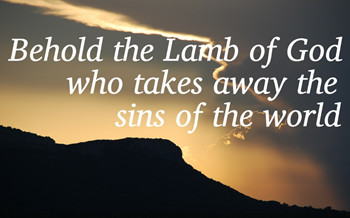The prophet Isaiah is dominant in our liturgical readings as we begin our new year. The reference in last week's passage is most significant..."Here is my servant...my chosen one upon whom I have put my Spirit...he shall bring forth justice...not crying out, not shouting...a bruised reed he shall not break, and a smoldering wick he shall not quench." This week we hear God's promise: "I will make you a light to the nations, that my salvation may reach to the ends of the earth." And next week we discover the promise fulfilled: "The people who walked in darkness have seen a great light; upon those who dwelt in the land of gloom a light has shone."
 John the Baptist also has a prominent place during these weeks: Last week, John protests his unworthiness at the baptism of Jesus - this week he boldly proclaims: "Behold, the Lamb of God, who takes away the sin of the world." Finally, next week, we will see John arrested - his mission fulfilled.
John the Baptist also has a prominent place during these weeks: Last week, John protests his unworthiness at the baptism of Jesus - this week he boldly proclaims: "Behold, the Lamb of God, who takes away the sin of the world." Finally, next week, we will see John arrested - his mission fulfilled.
It is at this moment that Jesus begins his public ministry - and the rest of Isaiah's vision is fully realized. He went about his ministry with passion, revealing the love of His Father to all and being especially tender and patient with the sick, the seekers and the sinners. These were bruised reeds. He did not handle them roughly, mistreat them or break their spirits. He listened, he was patient, he healed, he challenged them to wholeness.
Jesus met so many who were smoldering wicks - people whose fire had almost gone out - people in the darkness of doubt and despair - people who had just about given up hope...But he did not quench the feeble spark by harsh legalism, by cold demands, by insensitivity to human weakness. No, he fanned the spark into flame by caring and concern, by a deep sense of compassion, by a loving acceptance of even the worst of human failures.
All of us are bruised reeds and smoldering wicks. We are far from perfect, and rather consistently plagued by failure and selfishness. We are much too easily hurt, too easily discouraged. We fall short of expectations; we display our frailty like open wounds. Yet despite this, the Lord has confidently chosen us to complete His work.
The gift of faith is given us in Baptism; it is nurtured by the example of family, the zeal of teachers, the power of prayer and sacrament. It is tested by our own personal search for freedom and independence: it is challenged by those who have no faith, by those whose only concerns are those of this world, by our own failures and disappointments. But it is also sustained by our constant turning to Jesus with our response: "Here I am Lord, I come to do your will."
There is a hunger in the human mind and heart for certainty in every aspect of life. We want to be sure; we want to be safe: we want to be successful. In the midst of this day-by-day struggle, there is the search for religious truth. Our mind asks about the existence of God, about the meaning of life and death, about life after death. We wonder about the Bible, about the existence of Jesus, about the authenticity of the church, about the meaning of the sacraments.
We read, we study, we listen, we wonder - and yet we keep saying: "Here I am Lord - despite my weaknesses, despite my lack of clarity, despite my confusion." He takes us as we are - and through us, His gift of peace and reconciliation is given to the world.
In a culture that is increasingly more fragmented and torn apart, giving ourselves over into His hands, learning to follow Christ, to find God in our daily lives and to truly live the life of discipleship is no easy feat. It is only when we allow our own ordinariness to be transformed by the hand of God, that we will be able to enter into the grace-filled living to which people of every age have been called.
It is only when we allow His touch to transform our lives that the words of Isaiah can become a concrete reality in this world - only then can we carry "the Light" to the nations.





